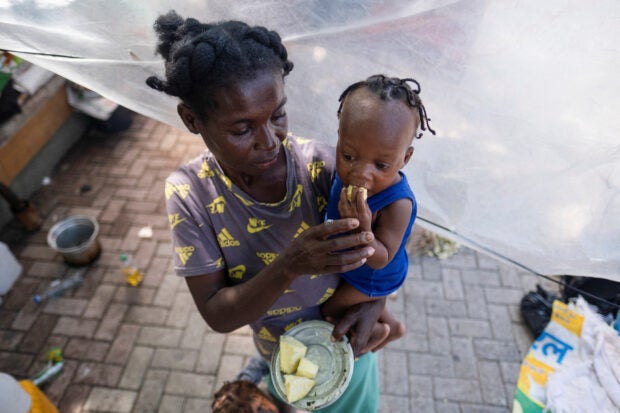UN chief urges international aid in visit to gang-ravaged Haiti

A woman feeds her baby at the Hugo Chavez Square where they shelter from gang war violence in Port-au-Prince, Haiti October 16, 2022. REUTERS FILE PHOTO
PORT-AU-PRINCE — United Nations Secretary-General Antonio Guterres, visiting Haiti’s capital on Saturday, said international aid has not met the impoverished country’s growing humanitarian needs, and urged more support for the Haitian police to fight gangs.
The visit was meant to spotlight the crises facing the Caribbean country as it struggles to combat violent gangs that have largely overrun the capital Port-au-Prince, and Guterres made a plea for solidarity.
The U.N. chief nine months ago proposed that one or more nations send a “rapid action force” to support Haiti’s security services. No such force has yet been deployed as no country has stepped up to take the lead.
“On the humanitarian front, the needs are increasing, but the international response is not,” Guterres told a news conference after meeting with Prime Minister Ariel Henry.
The two discussed the importance of a security force to curb gang activity so Haiti can distribute humanitarian aid, expand the economy and develop stronger political processes, he added.
“We are in full agreement about the need for the international community, the (U.N.) Security Council and member countries to provide the necessary forces for the international community to come and support the Haitian police,” Guterres said.
Elections also were a topic of discussion, he said. “We also discussed different steps that are being taken … for credible elections to be able to take place.”
Henry, who took power in 2021 days after the assassination of President Jovenel Moise, has repeatedly postponed elections, citing first an August 2021 earthquake that killed more than 2,000 people, and then gang violence.
He has pledged to leave office by Feb. 7, 2024.
Guterres in April said the insecurity in Port-au-Prince was comparable to that in countries in armed conflict, and that Haitians were facing one of the worst human rights crises in decades.
Last September, gangs worsened the humanitarian situation by blocking a fuel terminal for six weeks, halting most economic activity. The U.N. Security Council in October sanctioned Haiti’s most powerful gangster, who was accused of leading the blockade to protest government fuel subsidies cuts.
The United States and Canada have also imposed sanctions on Haitian political figures and business people.
While there has been broad support for Guterres’ proposal to create a rapid action force, with several countries expressing interest in contributing, none has volunteered to lead a deployment, diplomats say.
Countries have been wary of supporting the unelected administration under Henry, who has said fair elections cannot be held under the current insecurity.
No community spared from violence
Guterres told the Security Council in April that gangs have been tightening their grip around metropolitan Port-au-Prince, “where no commune is now spared from gang-related turf wars.”
“In many violence-affected areas, economic activity remains completely paralyzed. At the same time, there has been an increase in the number of people leaving Haiti, both by sea and across the land border to the Dominican Republic,” he said.
The U.N. refugee agency said some 73,500 people fled Haiti last year. The United Nations says 5.2 million – nearly half Haiti’s population – need humanitarian assistance in 2023. It has appealed for $720 million to deliver aid this year, but so far it is only 23% funded.
Guterres has said the Haitian police estimate there are seven major gang coalitions and around 200 affiliated groups. They have ambushed and attacked the security forces, while “other gang tactics include spreading terror by indiscriminately shooting at passengers on public transport and rape.”
Any foreign-led military rapid action force would not deploy as a U.N. mission, but would likely receive U.N. Security Council backing. The U.S. has said it would seek a council resolution to show support for such an operation, but diplomats said that would only happen once a force was formed.
A U.N. political mission is currently deployed in Haiti.
U.N. peacekeepers were deployed to Haiti in 2004 after a rebellion led to the ouster and exile of then-President Jean-Bertrand Aristide. Peacekeeping troops left in 2017 and were replaced by U.N. police, who departed in 2019.
Haitians are wary of an armed U.N. presence. The country was free of cholera until 2010, when U.N. peacekeepers dumped infected sewage into a river. More than 9,000 people died of the disease, and some 800,000 fell ill.
RELATED STORIES
Haiti needs international force to end ‘living nightmare’ – UN rights chief
Haiti’s deadly vigilante movement sees decline in gang violence – report
Subscribe to INQUIRER PLUS to get access to The Philippine Daily Inquirer & other 70+ titles, share up to 5 gadgets, listen to the news, download as early as 4am & share articles on social media. Call 896 6000.